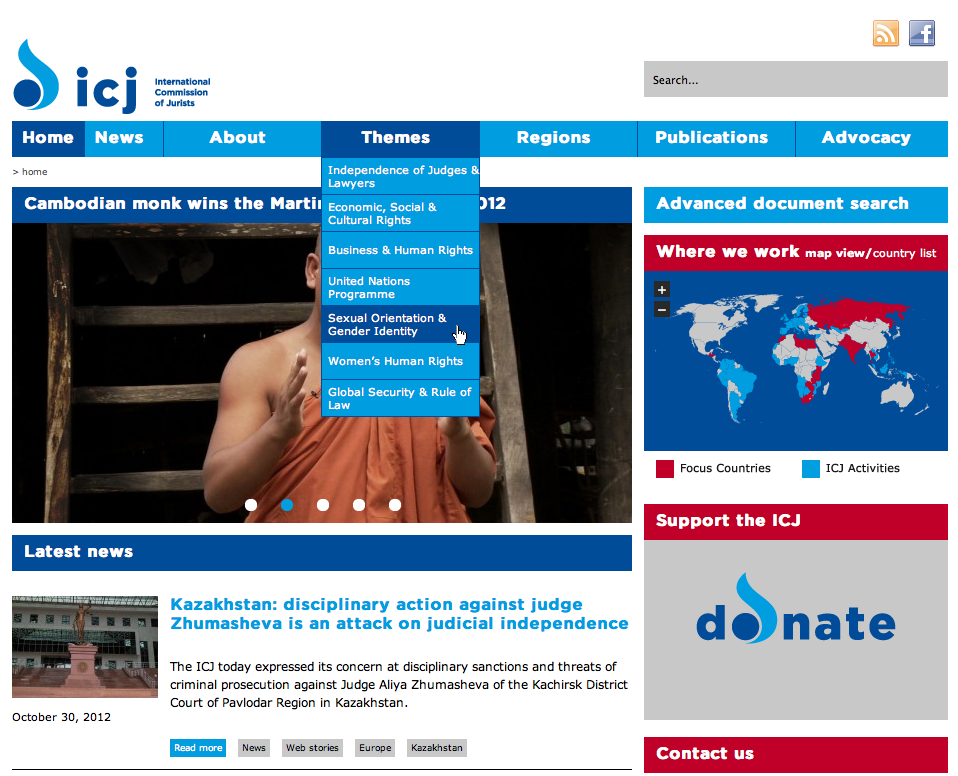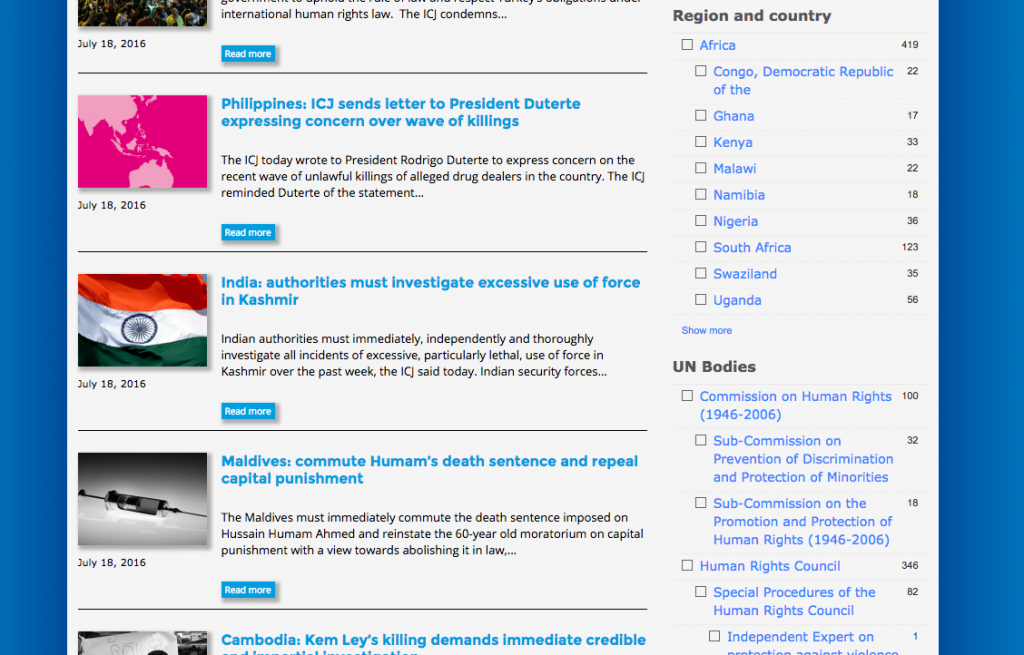The new website of the International Commission of Jurists (ICJ) is online and this is good news, as now there is much improved access to an incredible amount of resources about human rights violations all around the globe.
The work had started in March and it has been great working with the ICJ. The wide scope of their activities and the number of resources on their website posed a formidable challenge, which helped us think about many aspects of organising information. To celebrate the successful completion of the website, we met with Wilder Tayler, Olivier van Bogaert and Patrick Hartmann in Geneva yesterday and were joined by graphic designers Roger Pfund and Carl Gilhon. We are happy that the high level participation on behalf of the ICJ shows how highly they value the product and the importance they attach to technology for their work.

Sharing best practices
With this blogpost we want to share a few things we learned and explain some of the tools developed, to show how they can be useful for other websites. By doing so, we aspire to spread knowledge and start a discussion about best practices of organising information online.
So let’s begin by taking the point of view of a user and talking about a few things that we think are good on the new ICJ website. Then, let’s turn to the often simple technological tweaks behind them.
Tying information together
Suppose you are generally interested in what a number of organisations do regarding violations related to sexual orientation. The ICJ is one you are particularly curious about, as its one of the oldest NGOs working in the field of human rights. Now you check out the themes on their website and find that there is one about ‘Sexual Orientation and Gender Identity’.

In the main body you’ll get an explanation of what the ICJ does and what it stands for. So far so good, but maybe you were more interested in recent developments – and that’s what you get if you click on ‘Latest News’ in the right column, and it’s only news about ‘Sexual Orientation and Gender Identity’, the topic you were looking for. The cool thing is, whenever the ICJ posts news and categorises them as belonging to that topic, it will automatically appear in that column, too.
And there’s not only a box for news, but one for advocacy as well, which links to the ICJ’s policy recommendations and statements. Additionally, there are a few more boxes – publications, links and a casebook – so everything that could be interesting for you is tied together and updated dynamically. That means, when previously you had to search for good stuff in every corner of a website, it now follows you, as you click through.
All you need is a plugin
Behind this is a simple plugin called ‘super recent posts’, which Hmayak Tigranyan developed for HURIDOCS and that is now available for free. With this plugin, everyone using wordpress can basically do the same. All you need to do is to install it and categorise your homepage resources, for example using another free plugin called ‘types’ . With the help of the also free plugin ‘dynamic widgets’, you can decide where on your website it should appear. Of course, all this categorising can take a while. But it will be worth it, especially for human rights organisations, which often have treasures of data that are not always linked effectively.

Yet, there are a lot more benefits to this. For the ICJ website, this was also useful for developing the advanced document search, a very powerful tool for users to find in an intuitive way resources or documents they are curious about. The search is more interactive than usual search engines, as it allows you to pick categories while you already see results. Thereby, you get an idea of what you actually can find, as you refine your criteria – so you don’t have to go through the hassle of trial and error using different search terms.
This way, you can be sure to find everything you want, since there is no risk of not getting results, because you use a different terminology than the people running the site, e.g. you search for ‘LGBT’, but in an article the author only refers to people being persecuted because of their ‘gender identity’. Hence, using a search where you see results immediately and that is based on clear categories will help you find more, as you don’t get lost in translation.
Only the beginning
The search and other tools, such as a map that allows simple access to ICJ activities will be discussed in more detail in future blog posts. With these, we want to share what we learned in this and other recently finished projects (such as the websites for the African Commission on Human and Peoples’ Rights, PRAWA or the Centre for Civil and Political Rights) and to showcase the work of the great people we work with. But, more importantly, want to discuss with you how this can be useful for your work, as the ultimate aim is not to congratulate ourselves, but to spread knowledge. Therefore, it would be great, if you tell us what you want to know and join the discussion. So get in touch!
